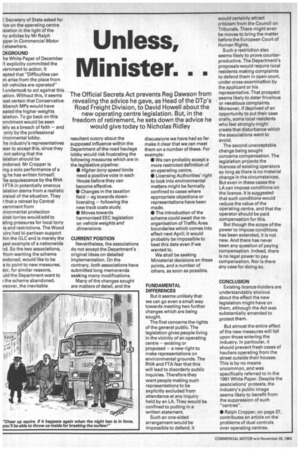Unless, Minister. . .
Page 54

If you've noticed an error in this article please click here to report it so we can fix it.
The Official Secrets Act prevents Reg Dawson from revealing the advice he gave, as Head of the DTp's Road Freight Division, to David Howell about the new operating centre legislation. But, in the freedom of retirement, he sets down the advice he would give today to Nicholas Ridley
E Secretary of State asked for ,ice on the operating centre islation in the light of the ny articles by Mr Ralph ,pper in Commercial Motor I elsewhere.
KGROUND 'he White Paper of December I1 explicitly committed the vernment to action. It epted that "Difficulties can ?n arise from the place from ich vehicles are operated" undertook to act against this iation. Without this, it seems lost certain that Conservative :kbench MPs would have eated the higher weights islation. To go back on this nmitment would be seen lely as a breach of faith — and only by the professional 'iron mental lobby.
'he industry's representatives )ear to accept this, since they not asking that the islation should be indoned. Mr Cropper is ing a solo performance of a ig he has written himself. 'he acquiescence by the RHA FTA in potentially onerous islation stems from a realistic araisal of the situation. They r that a retreat by Central vernment from tironmental protection iinst lorries would add to sting pressures for local lorry is and restrictions. The Wood uiry had bi-partisan support hin the GLC and is merely the gest example of a nationwide qd. So the two associations, from wanting the scheme )ndoned, would like to be e to point to new measures. kir, for similar reasons, uld the Department want to :the scheme abandoned. Ireover, the inevitable resultant outcry about the supposed influence within the Department of the road haulage lobby would risk frustrating the following measures which are in the legislative pipeline: • Higher lorry speed limits need a positive vote in each House before they can become effective.
• Changes in the taxation field — eg towards downlicensing — following the new track costs study.
• Moves towards harmonised EEC legislation on vehicle weights and dimensions.
CURRENT POSITION Nevertheless, the associations do not accept the Department's original ideas on detailed implementation. On the contrary, both associations have submitted long memoranda seeking many modifications.
Many of the changes sought are matters of detail, and the discussions we have had so far make it clear that we can meet them on a number of these. For example: • We can probably accept a more restricted definition of an operating centre.
• Licensing Authorities' right to look into environmental matters might be formally confined to cases where appropriate objections or representations have been made.
• The introduction of the scheme could await the reorganisation of Traffic Area boundaries which comes into effect next April; it would probably be impossible to beat this date even if we wanted to.
We shall be seeking Ministerial decisions on these points, and a number of others, as soon as possible.
FUNDAMENTAL DIFFERENCES But it seems unlikely that we can go even a small way towards meeting two further changes which are being sought.
The first concerns the rights of the general public. The legislation gives people living in the vicinity of an operating centre — existing or proposed — a new right to make representations on environmental grounds. The RHA and ETA fear that this will lead to disorderly public inquiries. Therefore they want people making such representations to be explicitly excluded from attendance at any inquiry held by an LA. They would be confined to putting in a written statement.
Such an one-sided arrangement would be impossible to defend. It would certainly attract criticism from the Council on Tribunals. There might even be moves to bring the matter before the European Court of Human Rights.
Such a restriction also seems likely to prove counterproductive. The Department's proposals would require local residents making complaints to defend them in open court, under cross-examination by the applicant or his representative. That prospect seems likely to deter frivolous or vexatious complaints. Moreover, if deprived of an opportunity to put their case orally, some local residents who feel strongly might create that disturbance which the associations want to avoid.
The second unacceptable change being sought concerns compensation. The legislation projects the licences of existing operators so long as there is no material change in the circumstances. But even in these cases the LA can impose conditions on the licence. It is suggested that such conditions would reduce the value of the operating centre, and that the operator should be paid compensation for this.
But though the scope of the power to impose conditions has been extended, it is not new. And there has never been any question of paying compensation. Indeed, there is no legal power to pay compensation. Nor is there any case for doing so.
CONCLUSION Existing licence-holders are understandably anxious about the effect the new legislation might have on them, although the Act was substantially amended to protect them.
But almost the entire effect of the new measures will fall upon those entering the industry. In particular, it should prevent fresh cases of hauliers operating from the street outside their houses. This is by no means uncommon, and was specifically referred to in the 1981 White Paper. Despite the associations' protests, the industry's public image seems likely to benefit from the suppression of such "centres".
• Ralph Cropper, on page 37, contributes an article on the problems of dual controls over operating centres.




























































































